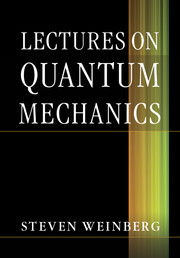Book contents
- Frontmatter
- Contents
- PREFACE
- NOTATION
- 1 HISTORICAL INTRODUCTION
- 2 PARTICLE STATES IN A CENTRAL POTENTIAL
- 3 GENERAL PRINCIPLES OF QUANTUM MECHANICS
- 4 SPIN ET CETERA
- 5 APPROXIMATIONS FOR ENERGY EIGENVALUES
- 6 APPROXIMATIONS FOR TIME-DEPENDENT PROBLEMS
- 7 POTENTIAL SCATTERING
- 8 GENERAL SCATTERING THEORY
- 9 THE CANONICAL FORMALISM
- 10 CHARGED PARTICLES IN ELECTROMAGNETIC FIELDS
- 11 THE QUANTUM THEORY OF RADIATION
- 12 ENTANGLEMENT
- AUTHOR INDEX
- SUBJECT INDEX
4 - SPIN ET CETERA
- Frontmatter
- Contents
- PREFACE
- NOTATION
- 1 HISTORICAL INTRODUCTION
- 2 PARTICLE STATES IN A CENTRAL POTENTIAL
- 3 GENERAL PRINCIPLES OF QUANTUM MECHANICS
- 4 SPIN ET CETERA
- 5 APPROXIMATIONS FOR ENERGY EIGENVALUES
- 6 APPROXIMATIONS FOR TIME-DEPENDENT PROBLEMS
- 7 POTENTIAL SCATTERING
- 8 GENERAL SCATTERING THEORY
- 9 THE CANONICAL FORMALISM
- 10 CHARGED PARTICLES IN ELECTROMAGNETIC FIELDS
- 11 THE QUANTUM THEORY OF RADIATION
- 12 ENTANGLEMENT
- AUTHOR INDEX
- SUBJECT INDEX
Summary
Wave mechanics failed badly in accounting for the multiplicity of atomic energy levels. This was most conspicuous in the case of the alkali metals, lithium, sodium, potassium, and so on. It was known that an atom of any of these elements can be treated as a more-or-less inert core, consisting of the nucleus and Z − 1 inner electrons, together with a single outer electron whose transitions between energy levels are responsible for spectral lines. Since the electrostatic field felt by the outer electron is not a Coulomb field, its energy levels in the absence of external fields depend on the orbital angular momentum quantum number ℓ as well as a radial quantum number n, but because of the spherical symmetry of the atom, not on the angular momentum z-component ħm. (See Eq. (2.1.30).) For each n, ℓ, and m there should be just one energy level. But observations of atomic spectra showed that in fact all but the s states were doubled. For instance, even a spectroscope of low resolution shows that the D line of sodium, which is produced in a 3p → 3s transition, is a doublet, with wavelengths 5896 and 5890 Angstroms. Pauli was led to propose that there is a fourth quantum number for electrons in such atoms, in addition to n, ℓ, and m, with the fourth quantum number taking just two values in all but s states. But the physical significance of this fourth quantum number was obscure.
- Type
- Chapter
- Information
- Lectures on Quantum Mechanics , pp. 97 - 147Publisher: Cambridge University PressPrint publication year: 2012

